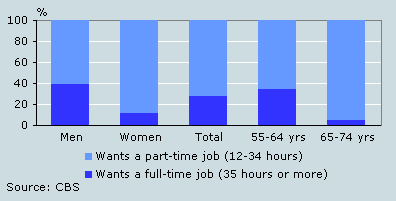Few older people without work want a job

In 2005, 160 thousand people in the age group 55–74 years who did not have a job said they would like to work for at least twelve hours a week. Most of them said they would like a part-time job, but they were not actively seeking work. Most people in this age group about 2.2 million people did not want to work at all.
People aged 55–74 years by labour market status and age, 2005
Three percent of over-65s looking for work
In 2005, 55 percent of 55–59 year-olds had a job. From the age of 60 the proportion of older working people drops quickly. Fewer than one in five 60–64 year-olds had a job, and only just under 4 percent of people aged over 65.
Seven percent of 55–59 year-olds did not have a job, but would have liked to have one. For the 60–64 years age group this is less than 6 percent, and for the over-65s only 3 percent. However, by far most of the people in these age groups who did not work, did not want to work.
Desired working hours of older people (55–74 years) without work who want to work, 2005
Older jobseekers want part-time jobs
Seven out of ten 55–74 year-olds looking for work wanted a part-time job. For the 55–64 year-olds this was two-thirds and over the age of 65 everyone who wanted to work wanted to do so part-time.
More men than women wanted a full-time job. Four out of ten jobless older men said they wanted a full-time job, compared with only one in ten non-working women.
Few older people actively look for work
One third of the 160 thousand over-55s who did not work were actively looking for a job. They had read job advertisements in newspapers or on the Internet, inquired among friends and employers about a job or actually applied for a job in the preceding four weeks. Men were more active in this respect than women.
Job seeking activities by older people (55–74 years) without work who want to work, 2005

Hermine Molnár and Clemens Siermann

